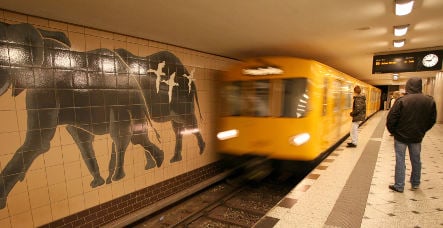The tale began with intermediaries such as Deutsche Bank and the financial arm of auto maker Daimler that approached cash-strapped communities, specialist Werner Ruegemer told AFP.
“These ‘arrangers’ told municipal authorities that thanks to a US fiscal loophole, they could obtain cash just by signing a piece of paper,” he explained.
The transactions are known as cross border leasing, or CBL.
Behind the German intermediaries were US banks operating from post boxes in locations such as the state of Delaware, known for its business-friendly tax environment.
In Berlin, indebted city officials agreed in 1997 to rent tram and subway cars to a US trust, and then sublet them back for use in the city’s transit system.
More than 1,000 cars were involved in the scheme, according to press reports.
The US investor that bought or rented German infrastructure got a tax benefit for foreign investments, while the city got money but became a renter, or sub-renter of the assets.
Berlin received €69 million ($90 million dollars) from its deal.
Another key actor in the transaction were banks or insurance companies that agreed to guarantee the value of the assets until the contract expired, between 25 and 99 years later.
Ruegemer said 180 such contracts were signed in Germany for an estimated €80 million.
In 2004 however, a US court uncovered the loophole.
Since then, German municipal authorities have come to realize the full content of the contracts they signed, written with complex technical terms over hundreds of pages and signed in New York during comfortable business trips for which all expenses were paid.
A US financier for example can demand a city continue to maintain subway cars it no longer uses so the investment does not lose its value, or prevent a worksite from proceeding.
And many banks and insurance companies that guaranteed the contracts are now distressed, forcing communities to guarantee the guarantor’s financial health or replace them, according to terms of the deals.
A frequent guarantor was AIG, which is in deep trouble after posting a 2008 loss of almost €100 billion.
US investors have therefore demanded that municipalities find other guarantors for the assets – at present often impossible – or provide their own guarantees.
The city of Bochum, in western Germany, had to buy $125 million in US Treasury bills on credit to insure the value of the sewer it had ceded.
For its tramways and subway cars, Berlin had contracted insurance in 2004 from a consortium that included AIG and the US investment bank Lehman Brothers, which went bankrupt in September 2008.
In a worst case scenario, the German capital could face claims for $200 million on the basis of the CBL contracts. “For now, no one has asked us for a cent,” said Petra Reetz, spokeswoman for the Berlin transit system BVG.
“If someone comes after us, we will not pay, we will take them to court,” she vowed.



 Please whitelist us to continue reading.
Please whitelist us to continue reading.